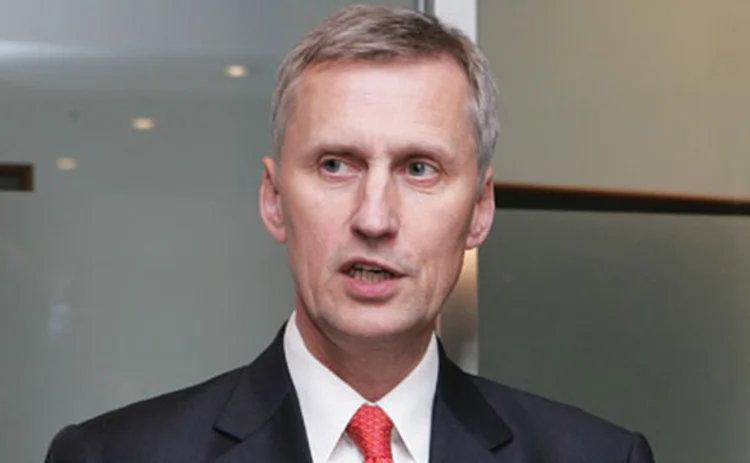FCA Chief Highlights Struggle against “Dystopian” Tech Scenario

Speaking at the Future of Financial Services conference in London, organized by PR firm Lansons, Wheatley highlighted how far high-frequency trading (HFT) has penetrated into public concern, along with cybercrime, and said that the UK regulator's role in maintaining a line between innovation and oversight is distinct. While technology offered the possibility of a brave new world in financial markets, he said, akin to the UK's industrial revolution, others take a darker look at what the pace of tech development implies.
"The concern here is that financial services become a kind of tech-led Wild West, if you like. Full of cybercrime, data losses, runaway algorithms, flash crashes and hash crashes of the type we saw last year, when hackers took over the twitter feed of [the Associated Press]," he said. "From the regulatory perspective, the challenge here is clear: Effectively, you want oversight that's able to reduce the risk of the latter, dystopian scenario without damaging the possibilities presented by the first. A delicate balance that will no doubt hinge on a multiplicity of complex questions and assessments in the years to come."
Risk and Reward
On the subject of HFT, Wheatley acknowledged the effect of Michael Lewis' book, Flash Boys, which has caused great consternation in the US over its allegations that the practice has effectively "rigged" equity markets. However, he poured water on the applicability of the issues raised by Lewis to the UK market, saying that structurally, the situation in London is not the same as in New York.
"There are undoubted benefits to HFT," he argued. "Most notably, the link between competition and market efficiency, as well as liquidity from reductions in bid-offer spreads and reduced transaction costs. On the other hand, there are, of course, clear risks to mitigate in areas like market fairness, market cleanliness and market resilience."
Some of the specific reasons why HFT in the UK can't be directly correlated with the US, he said, included differences in best execution, geographically dispersed markets in the UK and the comparatively low level of dark trading in the UK. Moreover, he argued, while the debate over HFT is linked to a classical risk-reward equation, it's really nothing new.
It now seems inevitable that the future of financial services will not be exclusively shaped by business or economics graduates, but those studying science, math and computing.
"As far back as the 18th Century, pioneer arbitrageurs were racing horse drawn carriages between New York and Philadelphia to speculate on shorts and futures," he said. "Today, those horses have been replaced by fiber optics, yes, but the broad challenge for regulators is much the same. We're simply seeing old problems resurfacing through new mediums."
Technology Protection
Wheatley then highlighted the advice given out to financial firms this month on cyber resiliency, pointing out that half of all stock exchanges had suffered some form of cyber-attack. The perpetrators, he explained, weren't just disgruntled individuals or so-called "hacktivists", but also organized crime gangs who were taking a big interest in the potential opportunities offered by cyber avenues.
He warned against seeing technology as the enemy, however, pointing out that advanced technology in place at the regulator handles some 2.7 billion detailed transaction reports per year through its analytics engines and surveillance software (provided by exchange group Nasdaq OMX). A direct result of this is the 28 successful convictions for insider trading since 2008, the number before that year being zero.
"We are currently working, as an example, on individual projects using computer networks with hundreds of gigabytes of RAM and hundreds of computing cores, capable, in turn, of crunching many millions of data entries per second. Enabling us to run through significant amounts of sophisticated econometric modelling in previously impossible ways," he said. "Likewise, in the wholesale space, the FCA now employs gifted quantitative analysts and technologists, with expertise in areas like maths and statistics, to spot unusual trading patterns in the mountains of so-called ‘blue-sheet' data we collect every day."
The point about the skill sets now in place at the regulator, he suggested, indicated a wider trend in financial services as a whole. Gone are the days of the bowler-hatted brokers wandering over London Bridge in the frigid British rain ─ the future, instead, belongs to the brains who built the bridge.
"In 2014, the debate is a question of degree. Just how far and fast will the financial world move? The years ahead may not turn out to be as space-age as some imagine. Nor as similar to today as others might hope," he said. "It now seems inevitable that the future of financial services will not be exclusively shaped by business or economics graduates, but those studying science, math and computing. Digital experts in Shoreditch, software developers in Silicon Valley, computer programmers in Budapest and so on and so forth. It is a regulatory responsibility to make sure this is handled the best it can possibly be."
Only users who have a paid subscription or are part of a corporate subscription are able to print or copy content.
To access these options, along with all other subscription benefits, please contact info@waterstechnology.com or view our subscription options here: https://subscriptions.waterstechnology.com/subscribe
You are currently unable to print this content. Please contact info@waterstechnology.com to find out more.
You are currently unable to copy this content. Please contact info@waterstechnology.com to find out more.
Copyright Infopro Digital Limited. All rights reserved.
As outlined in our terms and conditions, https://www.infopro-digital.com/terms-and-conditions/subscriptions/ (point 2.4), printing is limited to a single copy.
If you would like to purchase additional rights please email info@waterstechnology.com
Copyright Infopro Digital Limited. All rights reserved.
You may share this content using our article tools. As outlined in our terms and conditions, https://www.infopro-digital.com/terms-and-conditions/subscriptions/ (clause 2.4), an Authorised User may only make one copy of the materials for their own personal use. You must also comply with the restrictions in clause 2.5.
If you would like to purchase additional rights please email info@waterstechnology.com
More on Regulation
Where have four years of Cusip legal drama gone?
The IMD Wrap: The antitrust case against Cusip Global Services has been a long, winding road. Reb recaps what you might have missed.
2026 will be the year agent armies awaken
Waters Wrap: Several AI experts have recently said that the next 12 months will see significant progress for agentic AI. Are capital markets firms ready for this shift from generative AI to agents?
Despite regulatory thaw in US, major questions remain globally for 2026
From crypto and tokenization to the CAT to consolidated tapes to T+1’s advancement, the regulatory space will be front and center in the New Year.
Will overnight trading in equity markets expand next year? It’s complicated.
The potential for expanded overnight trading in US equity markets sparked debate this year, whether people liked it or not.
Waters Wavelength Ep. 342: LexisNexis Risk Solutions’ Sophie Lagouanelle
This week, Sophie Lagouanelle, chief product officer for financial crime compliance at LNRS, joins the podcast to discuss trends in the space moving into 2026.
Citadel Securities, BlackRock, Nasdaq mull tokenized equities’ impact on regulations
An SEC panel of broker-dealers, market-makers and crypto specialists debated the ramifications of a future with tokenized equities.
FIX Trading Community recommends data practices for European CTs
The industry association has published practices and workflows using FIX messaging standards for the upcoming EU consolidated tapes.
Interview: Linda Middleditch, Regnology
Regnology’s Linda Middleditch discusses its acquisition of Wolters Kluwer’s FRR business







